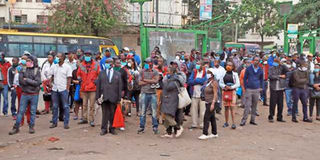Where Kenyans are flouting virus rules with reckless abandon

Nairobi residents waiting for matatus without keeping safe distance at Khoja Bus Station on Monday, April 20, 2020. PHOTO | DENNIS ONSONGO | NATION MEDIA GROUP
What you need to know:
The Nation established that some people are just complying with the Health ministry’s social distancing and handwashing directives to avoid arrests.
The majority of residents are going about their businesses as usual in total disregard of the guidelines put in place for their own safety.
More people have continued to violate guidelines aimed at flattening the Covid-19 curve even as the government reminds the public that the power to stop the spread of the virus is in their hands.
The Nation Weak Link series seeks to expose areas where behaviour change remains a stumbling block in the war against coronavirus.
With five confirmed Covid-19 cases in Nakuru, the county is emerging as one of hotspots. With that worrying statistic, one would expect that residents of the biggest town in Rift Valley region and surrounding counties would be cautious not to catch the deadly virus.
But you would be wrong. Here, nothing seems to have changed. A majority of traders and residents have thrown caution to the wind.
The Nation established that some people are just complying with the Health ministry’s social distancing and handwashing directives to avoid arrests.
The majority of residents are going about their businesses as usual in total disregard of the guidelines put in place for their own safety.
In Nakuru town, the new matatu termini could be the weakest link in the spread of the virus as operators are neither wearing masks nor observing basic social distancing.
But why?
Mr Peter Maina, a Mwaki Sacco driver, said the biggest challenge at the terminus is disorganisation and overcrowding during peak hours.
“In the process of calling customers, touts have to remove their face marks in order to be heard well,” he said.
“And when they are fighting for the passengers, they end up holding them, a move that can easily spread the virus.”
At Ziwani grounds, the disorderly manner in which the matatus are operating and the unruly behaviour of operators are favourable to the spread of the virus.
And in estates, its business as usual even as it emerged that the number of those testing positive continues to rise countrywide.
Similar scenarios were observed at open air markets in the town.
At Heshima roadside market along the busy Nakuru-Nyahururu highway, traders continue selling their wares in total disregard of social distancing.
Ms Mary Wanjiru, a trader, blamed limited space for the blatant disregard of the ministry’s guidelines.
"We have very little space. It is not our fault that we are still crowding here I wish we were given another place that can accommodate all of us,” said the trader.
Although there are several hand washing points at strategic places within the roadside market, social distancing is a headache.
The most evident sign of ignorance is at the makeshift Wakulima market, which has been shifted to Afraha Stadium Annex.
The muddy open air market is teeming with hundreds of traders, who are mingling and selling their produce to customers with little regard for the lurking danger.
“There is a lot of confusion here as we are still settling down. Further, there is little sensitisation on social distancing,” said a fruit vendor.
“This virus is a terrible killer. We have seen what it has done in Italy, the US, Spain and other European countries. However, everybody here is scrambling to get a customer,” said Ms Margret Wangui, who sells fruits.
At the market’s four gates, riders scramble for clients leaving the market, making the situation worse.
“This market is so huge unlike where we were stationed previously in one entrance and all our customers knew us. If I keep social distance here, my children will have nothing to eat in the evening,” said Mr Caleb Omurwa, a boda boda rider.
Motorists using Moi Road in the morning are having a nightmare as boda boda riders, tuk tuks and trucks bringing fresh produce cause huge traffic snarl-ups.
Invarious estates especially in the informal settlement areas, roadside maize roasters continue to operate in complete disregard of social distancing regulations.
Further, boda bodas and matatu crew are still carrying more passengers than is required. For instance, riders
Boda boda riders, for instance, are carrying up to four passengers. Even worse, neither the riders nor the passengers are wearing masks.
Matatus, especially those ferrying passengers from Nakuru town to far-flung areas including Subukia, Njoro, Salgaa and Molo still carry 14 passengers.
"I urge residents to follow the Ministry of Health guidelines because it is for the sake of their health. For those who still want to operate dangerously, I will send my officers to ensure they follow the guidelines," county Health Chief Officer Samuel King'ori said.
In Molo and Elburgon trading centres as well as areas where young people wait for casual jobs, social distancing seems like a foreign concept.
In Maralal, Samburu County, residents are overcrowding at movie shops.
At Karagita beach in Lake Naivasha, most traders are going about their businesses unconcerned about social distancing.
Only a few have adhered to the guidelines aimed at curbing the spread of coronavirus by wearing masks. “Operators seem unperturbed by the global pandemic, and this is a serious concern,” said Mr David Kilo, a seasoned lake operator.
With the lake being the only source of livelihood for most locals especially at the sprawling Karagita estate, caution has been thrown to the wind.
Fish trade continues to thrive, with only a few sanitising public places for mongers and lake operators.
Reported by Francis Mureithi, Geoffrey Ondieki, Macharia Mwangi, Joseph Openda Eric Matara and John Njoroge




